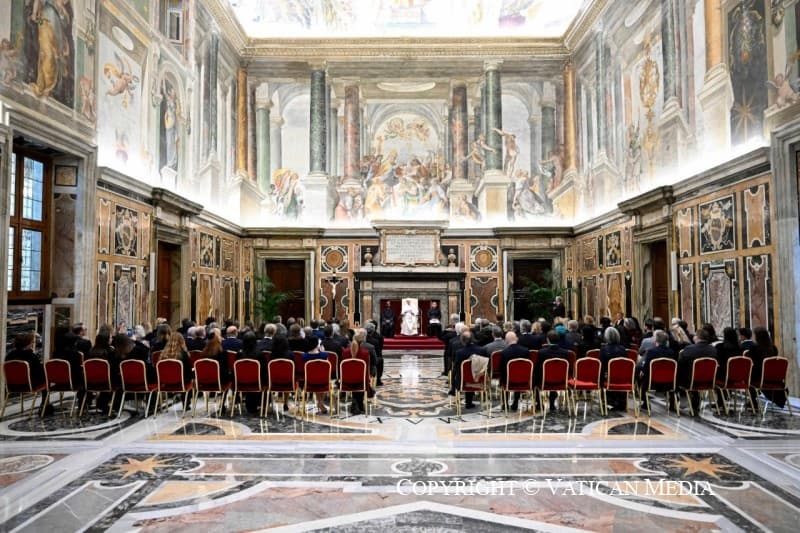If there is one thing that has become clear in the first six months-and-a-bit of Pope Leo XIV’s reign, it is that he cares very much about education in the deepest sense of the word and understands both keenly and profoundly how emerging 21st-century realities challenge educators.
“Artificial intelligence is transforming many aspects of our daily lives, including education, entertainment and the safety of minors,” Pope Leo said Thursday.
He was speaking in the Clementine Hall of the Apostolic Palace, to participants in a conference on the dignity of children and adolescents in the age of artificial intelligence.
The conference was sponsored by the Italian Telefono Azurro organization, which began in the second half of the 1980s as a telephone hotline for children and adolescents facing various difficulties and has grown since into a research and advocacy organization while continuing its crisis-response mission.
Telefono Azurro is an Italian organization, but Leo’s message to conference participants was overtly global in scope.
The use of AI “raises important ethical questions,” Leo said, “especially concerning the protection of the dignity and well-being of minors,” who are “particularly vulnerable to manipulation through AI algorithms that can influence their decisions and preferences.”
Leo is aware of a need for concerted national and international efforts to safeguard minors especially though by no means exclusively.
“Governments and international organizations,” the pontiff said, “have a responsibility to design and implement policies that protect the dignity of minors in this era of AI.”
Leo also said policies should update data-protection laws “to address new challenges posed by emerging technologies,” and promote “ethical standards for the development and the use of AI,” but he did not get into specifics.
It is well worth mentioning in this regard that the Vatican under Pope Francis began tackling these challenges several years ago, with a series of conferences and a Call for AI Ethics.
Originally signed in February 2020 by the Pontifical Academy for Life, Microsoft, IBM, the UN’s Food and Agriculture Organization, and Italy’s Ministry of Innovation, the Call for AI Ethics promotes an ethical approach to artificial intelligence and involves – by design – leaders from tech and industry, government, academia, and civil society.
RELATED: Tech heads join Vatican in ‘clarion call for a new generation of ethics’
The number of signatories to the Call for AI Ethics has expanded across categories over the years, while papal interventions on the subject have also increased.
It also bears mention that the theme Pope Leo XIV has chosen for his Message to mark the 2026 World Day of Social Communications is Preserving human faces and voices as the world wrestles with the emergence of powerfully disruptive new technologies.
“In today’s communication ecosystems,” reads a press release from the Vatican’s communications apparatus announcing the theme, “technology influences interactions more than ever before – from algorithms curating news feeds to AI authoring entire texts and conversations.”
“The challenge,” the release continues, “is to ensure that humanity remains the guiding agent.”
“The future of communication must be one where machines serve as tools that connect and facilitate human lives,” the announcement also says, “rather than erode the human voice.”
All that is easier said than done, as anyone involved in education will tell you, and nobody has all the answers. The Catholic Church, however, knows a good something about human nature and carries an immense store of historical memory.
Pope Leo XIV appears to be leading by example, encouraging the practice of both the listening and the talking sides of communication.
Under Leo and under Francis before him, the Vatican has been listening to experts on the technical side of things – the ones designing and marketing new technologies and the ones studying their effects – and has been speaking about the hard core of human wisdom the church carries in her historical memory.
“It is indeed important to draft and enforce ethical guidelines,” Leo XIV said in his remarks on Thursday of last week, “but that is not enough.”
He said “daily, ongoing educational efforts” are needed, “carried out by adults who themselves are trained and supported by networks of collaboration.”
In order to develop those networks, the adults need to understand the risks inherent in the use AI. The risk profile is changing as rapidly as the AI tech is developing, making it it very difficult to stay abreast of specific challenges. There is, in short, precious little time to think things through.
Educators – including parents, who are the first and always the primary educators of their children – have long since become aware of how dangerous to children and young people is premature, unlimited and unsupervised digital access. Such access to digital tech has already stunted at least a generation of young people, who struggle to form relationships at all.
“Only by taking part in the discovery of such risks and the effects on their personal and social life,” Leo said, “can minors be supported in approaching the digital world as a means of strengthening their ability to make responsible choices for themselves and for others.”
Leo XIV is aware of the stakes, too.
He called the mission of developing an understanding of emerging AI tech “a vital exercise in safeguarding human originality and connectedness, which must always be guided by respect for human dignity as a fundamental value.”
“Only by taking an educational, ethical and responsible approach,” he said, “can we ensure that artificial intelligence serves as an ally, and not a threat, in the growth and development of children and adolescents.”
That is a tall order.
It is also further evidence of Leo’s desire to harness the Church’s “expert[ise] in humanity” – to borrow Pope St. Paul VI’s phrase – to face and outface the disruptions of the 21st century in a way that puts human nature front-and-center, before humanity allows itself to be eclipsed.
The question is: How?
Follow Chris Altieri on X: @craltieri












